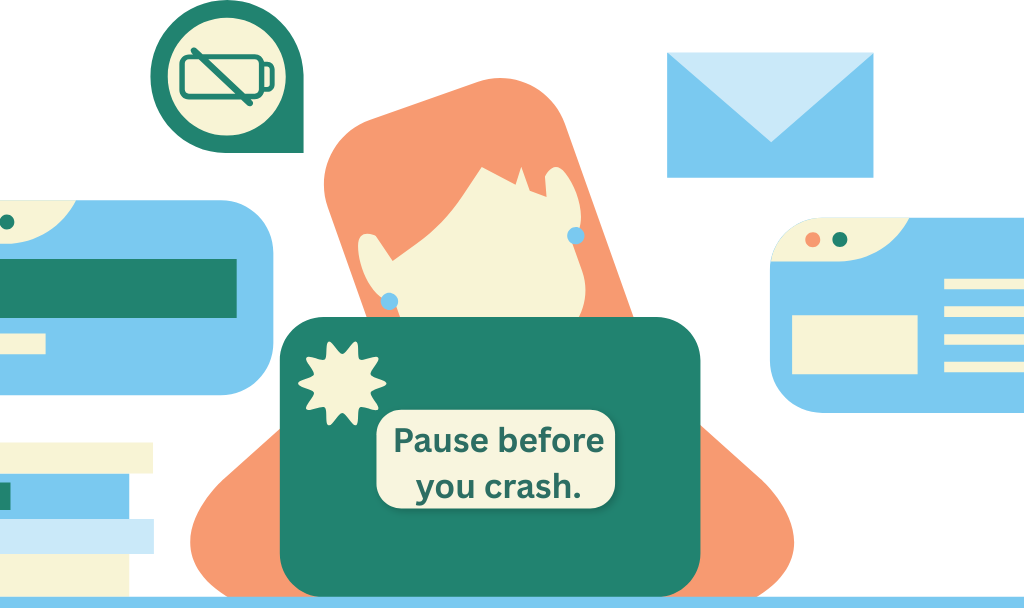The Tiny Things That Wear Us Down
Why emotional friction matters, and how to catch it before you're crying over salad dressing.
Part of why we miss the signs is because they’re small. A weird interaction at work. A group chat that suddenly goes quiet. A commute that’s just a little longer than usual. None of it seems big enough to matter on its own. But like a browser tab playing music you can’t find (hello, fellow tab hoarders), microstresses wear us down until we’re unraveling over a missing sock; the final straw after a loooong day.
The warning signs don’t shout. They whisper until we snap over something like a missing sock.
If you’re not crying, you’re fine (right?)
We think care only matters in a crisis. If it’s not a “meltdown,” it’s fine, right? At least that’s what we’ve been taught; that it only “counts” if it’s dramatic. Major heartbreak? Valid. Panic attack in a Trader Joe’s parking lot? Definitely. But feeling vaguely irritated by how someone said “sounds good” in Slack? That feels like overreacting, so we stuff it down, open another tab, and keep going.
We know who to blame: the culture. We glorify toughness like it’s an Olympic sport (yes, Olympians are tough, we get it). We reward ourselves for enduring things we probably shouldn’t have had to endure in the first place. And sure, sometimes pushing through is necessary. But it’s a little wild that we’ll schedule a dentist appointment because our gums bled once, yet completely ignore the emotional jaw-clenching of daily life. Don’t you think?
The microstress effect (or, why you’re tired but can’t explain it)
There’s actually a term for this: microstressors. These are the tiny, recurring emotional hits that don’t feel “bad enough” to flag; emotional paper cuts that somehow always find the tender spots.
Think:
Constantly softening your tone to seem less “intense”
Being available for everyone’s texts but not your own thoughts
Feeling low-key judged by your unread DMs (like really)
Or my personal favorite: that buzzing itch when you’re both wired and checked out, simultaneously.
Each one seems small. But string them together and you’re not just tired; you’re emotionally worn out. In fact, research shows that daily hassles, not just major life events, can quietly impact your physical health over time. So maybe that coworker who always “circles back” without any new info isn’t just annoying; they might actually be taking a tiny toll on your well-being.
Three signs you might be micro-stressed
Microstress can be sneaky. Here are a few signs it might be showing up for you:
You’re technically functioning, but it feels like doing your taxes underwater
You’re annoyed, but can’t tell if it’s the person, the platform, or the existential weight of it all
You feel more “blank” than burnt out, like your emotional Wi-Fi is glitchy, but nobody reset the router (the router is still a thing, right?)
How to care for the quiet stuff
The good news? You don’t need a 10-step ritual or a Himalayan salt lamp blessed by forest monks to manage microstress. A few small daily check-ins (think of it as emotional hygiene) can make all the difference. Just small, gentle pauses; little emotional pit stops to check in before your inner engine light comes on (we don’t want that, right?).
Here’s what that can look like:
1. Name the texture of what you’re feeling: it doesn’t have to be poetic (in fact, keep it simple). “Weird.” “Off.” “Edgy, but not in the cool way.” Just naming it gives shape to what feels foggy.
2. Give yourself a micro-reset: before you launch into the next thing, take one deep breath. Relax your jaw. Drop your shoulders. Yes, even if you’re mid-scroll. Especially if you’re mid-scroll.
3. Try a daily energy check-in: ask yourself:
What drained me today?
What gave me a tiny lift, even if it was just 20 seconds of sun on my face?
Just notice. That’s how care begins; not with a grand gesture, but with attention.
New here? You can start with this welcome post; it’s a gentle intro to what Joyedmind’s all about.
A gentle reframe
You don’t need to be in crisis to deserve care.
You don’t have to earn rest with productivity.
You don’t need to wait for a breakdown to ask yourself: “Hey, how am I actually doing?”
Tending to small, invisible stressors isn’t indulgent. It’s maintenance. It’s how you keep your emotional system running without waiting for smoke to come out of the hood.
It’s you saying, “I don’t need to crash in order to pause.” And that, frankly, is revolutionary. It might not sound like much, but it is.
And… because emotional isn’t always grand gestures, here’s a little honest check-in from me:
One thing grounded me this week: watching the light change on the wall for 30 seconds. I accomplished nothing and it felt great.
One thing that ungrounded me this week: checking my phone for the weather and resurfacing 15 minutes later in a Reddit thread about someone else's roommate drama. I don't even have a roommate.
Your turn. What’s one small thing that grounded or ungrounded you this week?
Or if you’re new here, here’s your soft landing.


